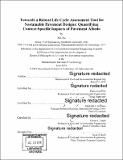Towards a robust life cycle assessment tool for sustainable pavement designs : quantifying context-specific impacts of pavement albedo
Author(s)
Xu, Xin, Ph. D. Massachusetts Institute of Technology
DownloadFull printable version (12.55Mb)
Other Contributors
Massachusetts Institute of Technology. Department of Civil and Environmental Engineering.
Advisor
Franz-Josef Ulm and Randolph E. Kirchain.
Terms of use
Metadata
Show full item recordAbstract
While guidance have been developed for pavement life cycle assessment (LCA) in recent decades, it has not been widely implemented for supporting environmentally conscious pavement designs, partially due to the limitations in sub-models for quantifying the use phase impacts, such as albedo. High-albedo surfaces reflect more shortwave radiation, exerting "radiative forcing" (RF) on the earth. It also affects the ambient temperature and results in changes in building energy demand (BED). In the past, the impacts of pavement albedo were often ignored or quantified using very simple models. The net effect of RF and BED impacts in the context of pavement LCA remains unknown. This thesis presents a comprehensive approach to assess the effectiveness of pavement albedo modification strategies in urban neighborhoods. To estimate RF impact, we adapt an empirical analytical model from the literature and further incorporate the effects of cloudiness and shadings in the urban area. For BED, we develop a hybrid framework coupling multiple numerical models to account for the interactions between buildings and surrounding environment. Statistical meta-models are employed to facilitate more efficient computations with fewer input variables. The impact of several context-specific factors are taken into account in these models. Case studies are carried out to demonstrate the approach and results for urban neighborhoods in Boston and Phoenix, making use of data extracted from climate simulations and GIS datasets. Comparative analysis shows that the impact of changing pavement albedo can vary from one neighborhood to another, depending on contextual factors such as urban morphology and microclimate. In the case of Boston, densely-built urban neighborhoods in downtown area exhibit net life-cycle burdens of nearly 120 kg CO₂-eq/m² due to a 0.2 increase in road albedo, while net GWP savings can be observed in most low-density residential neighborhoods. This work provides insights into pavement albedo impacts at an urban scale and will help urban planners or decision makers to make informed decisions on whether pavement albedo enhancement is an option worth pursuing in a given urban area/neighborhood. Site-specific evaluation of pavement albedo impacts should ultimately be integrated into pavement LCA and guide decisions towards more sustainable pavement designs.
Description
Thesis: Ph. D., Massachusetts Institute of Technology, Department of Civil and Environmental Engineering, 2018. Cataloged from PDF version of thesis. Includes bibliographical references (pages 99-107).
Date issued
2018Department
Massachusetts Institute of Technology. Department of Civil and Environmental EngineeringPublisher
Massachusetts Institute of Technology
Keywords
Civil and Environmental Engineering.